- Clone
- RM134L (See other available formats)
- Regulatory Status
- RUO
- Other Names
- OX-40L, CD134L, CD252, TNFSF4
- Isotype
- Rat IgG2b, κ
- Ave. Rating
- Submit a Review
- Product Citations
- publications
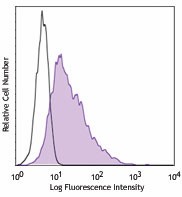
-

C57BL/6 splenocytes were stimulated with anti-mouse IgM and CD40 antibodies for 3 days, then stained with OX40L (clone RM134L) PE (filled histogram) or rat IgG2b PE isotype control (open histogram).
| Cat # | Size | Price | Quantity Check Availability | Save | ||
|---|---|---|---|---|---|---|
| 108805 | 50 µg | 84€ | ||||
| 108806 | 200 µg | 254€ | ||||
CD252 is a 35 kD member of the TNF superfamily and is also known as OX40 ligand, OX40L, and CD134L. The CD252 is expressed on activated B cells and antigen presenting cells. CD252 interacts with OX40 antigen (CD134), expressed predominantly on activated T cells to increase proliferation and IL-2 production and to enhance proliferation and immunoglobulin secretion in activated B cells.
Product DetailsProduct Details
- Verified Reactivity
- Mouse
- Antibody Type
- Monoclonal
- Host Species
- Rat
- Immunogen
- Rat NRK-52E cell line transfected with mouse OX-40L
- Formulation
- Phosphate-buffered solution, pH 7.2, containing 0.09% sodium azide.
- Preparation
- The antibody was purified by affinity chromatography, and conjugated with PE under optimal conditions.
- Concentration
- 0.2 mg/ml
- Storage & Handling
- The antibody solution should be stored undiluted between 2°C and 8°C, and protected from prolonged exposure to light. Do not freeze.
- Application
-
FC - Quality tested
- Recommended Usage
-
Each lot of this antibody is quality control tested by immunofluorescent staining with flow cytometric analysis. For flow cytometric staining, the suggested use of this reagent is ≤ 0.25 µg per 106 cells in 100 µl volume. It is recommended that the reagent be titrated for optimal performance for each application.
- Excitation Laser
-
Blue Laser (488 nm)
Green Laser (532 nm)/Yellow-Green Laser (561 nm)
- Application Notes
-
The RM134L antibody can block the costimulatory activity of OX40L. Additional reported applications (for the relevant formats) include: immunohistochemical staining of acetone-fixed frozen sections3, and in vivo and in vitro blocking of OX-40L-OX-40 functional interaction1,2,4. The LEAF™ purified antibody (Endotoxin <0.1 EU/µg, Azide-Free, 0.2 µm filtered) is recommended for functional assays (Cat. No. 108808).
-
Application References
(PubMed link indicates BioLegend citation) -
- Akiba H, et al. 1999. J. Immunol. 162:7058. (Block)
- Akiba H, et al. 2000. J. Exp. Med. 191:375. (Block)
- Hoshino A, et al. 2003. Eur. J. Immunol. 33:861. (IHC)
- Terrazas LI, et al. 2005. Intl. J. Parasitology. 35:1349. (Block)
- Zheng X, et al. 2010. Invest Ophthalmol Vis Sci. 51:3076. PubMed
- Product Citations
-
- RRID
-
AB_313404 (BioLegend Cat. No. 108805)
AB_313404 (BioLegend Cat. No. 108806)
Antigen Details
- Structure
- NGF/TNF superfamily, 35 kD
- Distribution
-
Activated B cells, antigen presenting cells
- Function
- B-cell/T-cell interaction, costimulation
- Ligand/Receptor
- OX40 (CD134)
- Cell Type
- Antigen-presenting cells, B cells
- Biology Area
- Costimulatory Molecules, Immunology
- Molecular Family
- CD Molecules, Immune Checkpoint Receptors
- Antigen References
-
1. Akiba H, et al. 1999. J. Immunol. 162:7058.
2. Stüber E, et al. 1995. Immunity 2:507.
3. Baum PR, et al. 1994. EMBO J. 13:3992. - Gene ID
- 22164 View all products for this Gene ID
- Specificity (DOES NOT SHOW ON TDS):
- CD252
- Specificity Alt (DOES NOT SHOW ON TDS):
- CD252
- App Abbreviation (DOES NOT SHOW ON TDS):
- FC
- UniProt
- View information about CD252 on UniProt.org
Related FAQs
- What type of PE do you use in your conjugates?
- We use R-PE in our conjugates.
Other Formats
View All CD252 Reagents Request Custom Conjugation| Description | Clone | Applications |
|---|---|---|
| Biotin anti-mouse CD252 (OX40L) | RM134L | FC |
| PE anti-mouse CD252 (OX40L) | RM134L | FC |
| Purified anti-mouse CD252 (OX40L) | RM134L | FC,IHC-F,Block |
| Alexa Fluor® 647 anti-mouse CD252 (OX40L) | RM134L | FC |
| APC anti-mouse CD252 (OX40L) | RM134L | FC |
| PE/Cyanine7 anti-mouse CD252 (OX40L) | RM134L | FC |
| PE/Dazzle™ 594 anti-mouse CD252 (OX40 Ligand) | RM134L | FC |
| TotalSeq™-C0924 anti-mouse CD252 (OX40 Ligand) | RM134L | PG |
| Ultra-LEAF™ Purified anti-mouse CD252 (OX40 Ligand) | RM134L | FC,IHC-F |
| TotalSeq™-B0924 anti-mouse CD252 (OX40 Ligand) Antibody | RM134L | PG |
| TotalSeq™-A0924 anti-mouse CD252 (OX40 Ligand) | RM134L | PG |
Customers Also Purchased

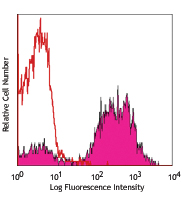
Compare Data Across All Formats
This data display is provided for general comparisons between formats.
Your actual data may vary due to variations in samples, target cells, instruments and their settings, staining conditions, and other factors.
If you need assistance with selecting the best format contact our expert technical support team.
-
Biotin anti-mouse CD252 (OX40L)
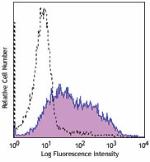
C57BL/6 splenocytes were stimulated with anti-mouse IgM+CD40... -
PE anti-mouse CD252 (OX40L)
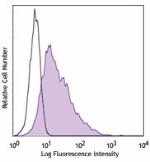
C57BL/6 splenocytes were stimulated with anti-mouse IgM and ... -
Purified anti-mouse CD252 (OX40L)
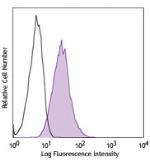
C57BL/6 splenocytes were stimulated with anti-mouse IgM and ... -
Alexa Fluor® 647 anti-mouse CD252 (OX40L)
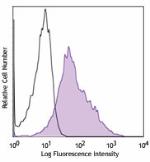
C57BL/6 splenocytes were stimulated with anti-mouse IgM and ... -
APC anti-mouse CD252 (OX40L)
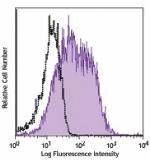
C57BL/6 splenocytes were stimulated with anti-IgM and anti-C... -
PE/Cyanine7 anti-mouse CD252 (OX40L)
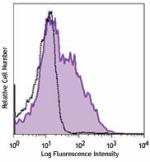
C57BL/6 splenocytes were stimulated with anti-mouse IgM and ... -
PE/Dazzle™ 594 anti-mouse CD252 (OX40 Ligand)
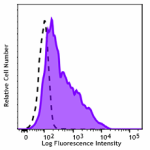
C57BL/6 mouse splenocytes were stimulated with anti-IgM and ... -
TotalSeq™-C0924 anti-mouse CD252 (OX40 Ligand)
-
Ultra-LEAF™ Purified anti-mouse CD252 (OX40 Ligand)
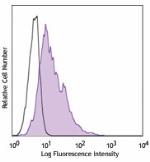
C57BL/6 splenocytes were stimulated with anti-mouse IgM and ... -
TotalSeq™-B0924 anti-mouse CD252 (OX40 Ligand) Antibody
-
TotalSeq™-A0924 anti-mouse CD252 (OX40 Ligand)
 Login / Register
Login / Register 










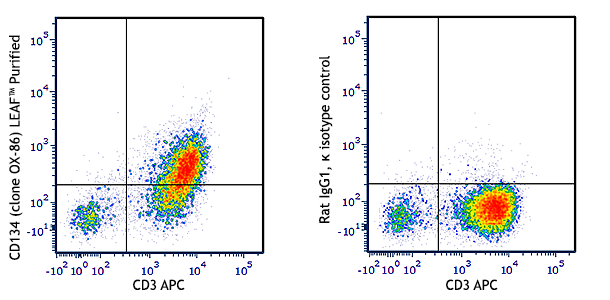
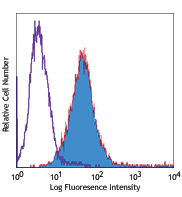



Follow Us